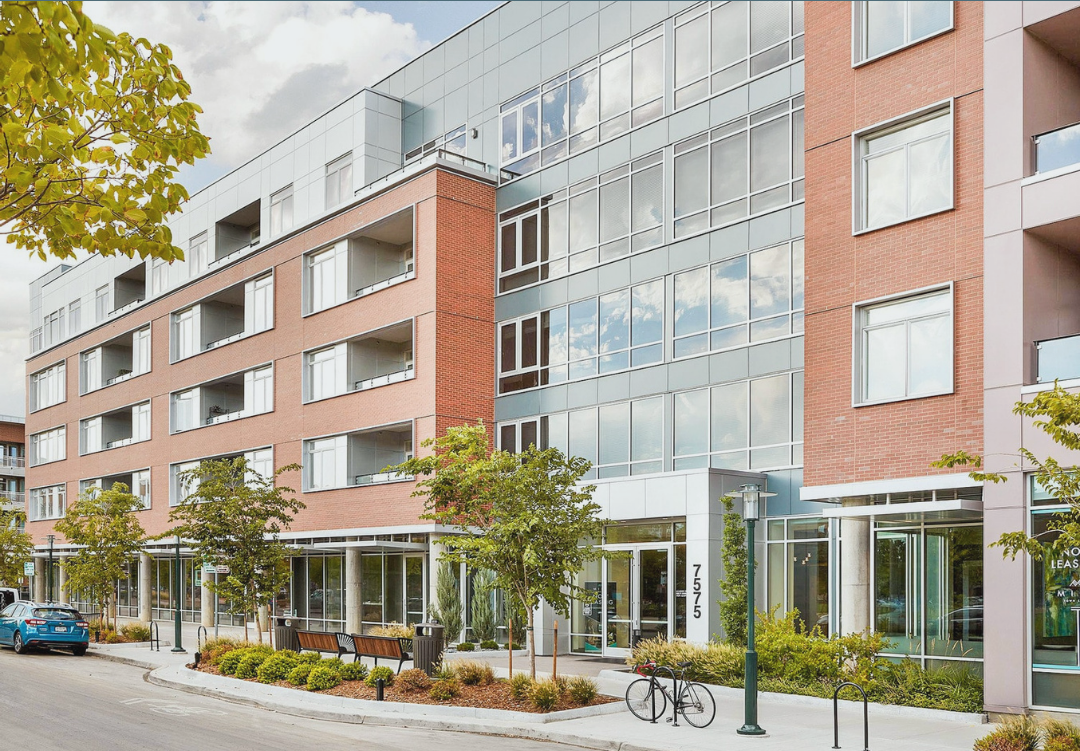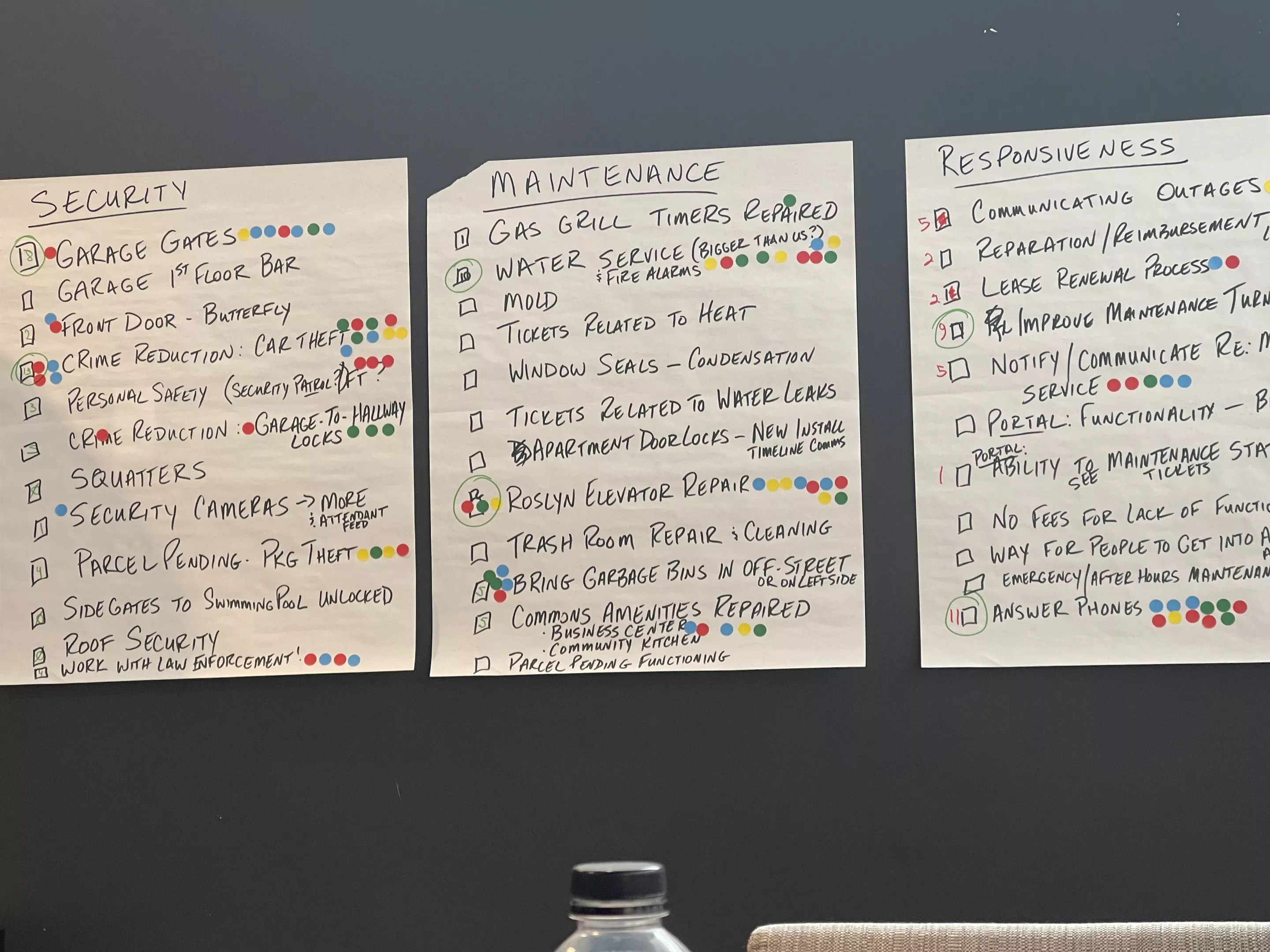
The Town Center Collection Facbeook

Audio By Carbonatix
In January, the pool at the 7575 Town Center apartments in Denver’s Central Park neighborhood was shut down by the Denver Department of Public Health & Environment over elevated pH levels unsafe for human health.
Tori Melavic – who has a child and often babysat others in the building before the poor maintenance and security caused her to move out – says the pH issues are just a drop in the bucket of overflowing problems at the complex.
“I swear you could walk around the building and there’s probably ten different areas where they had to redo carpet,” she contends. “The reason why our residents are trying to do something is because there’s no comfort in when they fix something [that] it’ll be fixed. … We’ll see an elevator mechanic with his truck there doing repairs. A month later, that same elevator will stop working again or will be stuck.”
Since last summer, issues have continued to pile up at the 7575 East 29th Place two-building complex – including mold, a lack of hot water and faulty security – which have led residents to advocate for change.
According to Tammy Vigil, marketing and communications specialist for DDPHE, the department has received at least eleven complaints since August 2022 alleging the building doesn’t meet the city’s Rules and Regulations Governing Residential Health. Three of those cases are still active.
The pool wound up reopening in February when the pH was 8.1 – the extreme high end of the allowable scale. In a March 28 inspection, however, it registered two more critical violations: one for low temperature and another for the gate locking mechanism failing to function properly.
“Our investigator noted that the pH was again on the extreme end of the allowable scale,” Vigil adds. The pH was 8.0.
While it might sound like a deal-breaker, not being able to take a relaxing dip isn’t even one of the main reasons that longtime tenant Lindsay Wadman has scorched 7575 as being “fake luxury apartments.” She coughs up over $2,000 a month for a one-bedroom apartment, but says the building barely lives up to a basic standard of living – much less the luxury price point.
“The water in our building is very bad,” she says. “There’s always been some kind of mold or plumbing issues.”
Wadman works from home and helps neighbors out by checking in on pets and walking dogs during the day, so she sees the ins and outs of the building – noting that one of the biggest safety issues is the fire alarms and how they constantly go off when there’s not an incident. Residents say problems exist in both the north and south buildings.
“No one pays attention to it because it goes off so often,” she says.
Captain JD Chisolm, public information officer for the Denver Fire Department, says they’ve been sent to the building six times in 2023 for calls related to the elevators or the fire alarm system. The last inspection for the property was in April 2022, Chisolm says.
“Any time there are frequent alarm activations in a single occupancy, people tend to become more complacent because the alarm is triggered so many times,” Chisolm explains. “Unfortunately, this defeats the purpose of the alarm and can pose a grave danger when things are serious.”
Melavic says the frequent fire alarms have caused her toddler son to stay awake at night, but it’s actually her constant worrying over mold – caused by flooding in the building – that has made the family lose the most sleep.
“Are we breathing in mold and mildew because the water in the hallway smells?” she questions. “It’s just sad, because families are moving out.”
In 2022, Melavic’s hallway flooded so badly that she had to walk through standing water to reach her door.
“We, as residents, were putting our own buckets and tubs under the drips in the hallway,” she points out. “They would fill up over 24 hours, and maintenance was nowhere to be seen. We would send emails; we would call; nothing, no response.”
Melavic says a lack of communication about maintenance exacerbated the problems. When the complex did finally get around to repairing things, like busted pipes, it was only about half the time that residents would receive notice that their water would be shut off for repairs.
“We’d all go to our private Facebook page and say, ‘Why do we not have water, and did anyone receive an email from the building?'” Melavic remembers. And the same went for elevator maintenance.
According to Melavic, it was a regular occurrence for two of the four elevators in her building to be broken. To make matters worse, residents weren’t given consistent status updates.
While maintenance – or lack thereof – has been one of their main concerns, it’s ultimately security that tenants say poses the biggest problem.
Teenagers have been known to sneak into the pool or onto the roof of the building, Melavic alleges, which made residents uncomfortable. The problem has grown to a legitimate risk over the past year as the garage door and mailroom door have both been broken, and there are regular car thefts, storage unit break-ins, and people experiencing homelessness who enter the building, according to residents.
“The door to the parking garage is constantly tampered with and broken,” Wadman says. “So people just break in and come into the building.”
Wadman says she’s often reported trespassers to the police and to management, but the latter refuses to shore up security to prevent break-ins.
Since Wadman has lived at 7575, building management has changed hands twice. It was originally managed by Forest City Apartment Management, which was sold to Brookfield Asset Management in 2018. Highmark Residential took over in 2021.
According to residents, each iteration has gotten worse and worse.

Residents of the 7575 Town Center apartments are working together to improve their home.
Lindsay Wadman
“I’ve never seen anything like the culture of Highmark,” Wadman says. “It’s a culture of disdain for residents, and dishonesty, and obfuscation instead of transparency, or at least customer service.”
Highmark did not respond to requests for comment, but it did send Wadman an official notice that she had violated her lease by calling the company out in statements posted to its internal messaging app for residents. Wadman had replied to a comment about management supposedly evicting a single mother from the complex – saying it was disgusting and she hates predatory landlords. Management claimed she wasn’t allowed to do that.
“You, and any occupants, and guests may not disrupt or interfere with our business operations, or communicate with us in a rude, hostile, or unreasonable manner, including times, manner, and amount of communications, or injure our reputation by making bad faith allegations against us to others,” the lease reads. “We are the sole judge of acceptable conduct.”
Wadman says she doesn’t understand how the company can know how its residents feel and still not try to make the situation better. The lack of communication has caused financial losses for her, with the leasing office losing her renewal paperwork and causing her to be served an eviction notice for being unlawfully in possession of her apartment – because she was living there without a lease.
When she confronted the office about the letter, she was told it was a mistake and her lease was restored. Management charged her hundreds of dollars in administration fees to make the lease restoration official, however.
“We have no comfort that they’re fixing things and it’ll stay stable,” Melavic says. “You’re just walking on eggshells that next month or next week a fire alarm will go off, or something will leak, or one of the amenities will be broken.”
Starting in November 2022, residents began using their tenant portal to document and discuss the problems they were having with security, maintenance and vermin, but realized management could see posts and was deleting negative ones. The tenants later switched to Facebook and began organizing a response – first meeting in person in February 2023, with plans to meet each month until something changes.
One of the tenants’ first steps was to send out a survey, which 57 residents responded to.
The research found that the top concerns among people were security, maintenance requests, staff responsiveness and the unreliability of amenities. The survey also showed that without those issues being fixed, 79 percent of people would choose to not re-sign their lease; 72 percent would post negative reviews online; and 65 percent would organize with other residents.
Additionally, 98 percent of people would actively discourage friends and family from moving in. The residents wrote a letter to Highmark and haven’t heard a response. They’re considering other means of taking action, including legal action.
Melavic also wound up making legal moves herself.
She provided management with a copy of the state’s Warrant of Habitability, saying she intended not to pay rent until her unit complied with its stipulations, including being free of mold. Melavic never received a response, and eventually decided to move out when her lease ended at the end of February.
While Melavic ultimately left, she had hoped to stay at the complex because the community is great, she says. Wadman, meanwhile, feels the exact same – but plans to keep fighting.
“I’m really stubborn,” Wadman says. “I love almost all my neighbors, and I love the neighborhood, and I care about their animals, too. … I don’t feel safe with the lack of security, but I have like twenty people I could go knock on their door and ask for help if I needed it, and that’s important.”